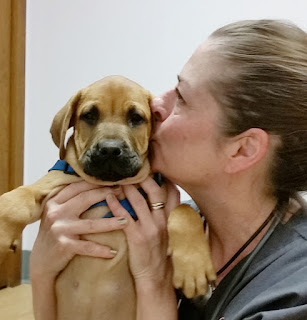What to Expect When You’re Expecting…a Fur Baby!
The excitement of bringing home a new
puppy is unrivaled to most, but there can be a lot of uncertainty and questions
for new pet parents or if it has been awhile since a new four legged fur baby
has been in your home!
Puppies and kittens make frequent veterinary trips in the first few months of
their life to ensure lifelong health. Booster shots, food nutrition,
learning about safety precautions and training are all things that new pet
owners should understand, and talking to your veterinarian is the best place to
start.
It can be scary for your new fur baby their first few nights at home, and in
order to make them feel safe it is important to give them their own space in a
quiet, warm area to relax. It is also important to get them in for their first
exam within the first week of adoption. We will break down the different core vaccines for both puppies and kittens as
well as other simple treatments to guarantee pet health.
Puppies:
- Bordetella
- Bordetella bronchiseptica
is the most common bacterial agent responsible for kennel cough in
dogs. This vaccine is required for boarding but is highly
recommended for all dogs. This vaccine is given one time after 8
weeks of age and some clinics will booster it 3 weeks later. - Distemper (DHPP)
- This
vaccine integrates multiple defenses against distemper, hepatitis,
parvovirus and parainfluenza. Vaccine is a series of 3 boosters, each
given 3-4 weeks apart. - Leptospirosis
- Lepto
is bacteria that is spread through stagnant water where small
rodents, wildlife will live and urinate. This can be lethal to
dogs and should be given especially when living in cities or by
forestry preserves. This vaccine is a series of 2 boosters, given 3-4
weeks apart. - Rabies
- This
vaccine is mandated by law! This is a one-time vaccine that is given is
on or after your pet is 16 weeks old and is good for 1 year. - Influenza
- Yes,
dogs can get the flu like humans. Although this is not considered a
“core” vaccine it is better to be safe than sorry if your pets daycare,
boarding facility, groomer (etc) were to have a flu outbreak. Vaccine is
a series of 2 boosters, given 3-4 weeks apart. - Lyme
- The
prevalence of ticks in the United States is increasing at an alarming
rate. In addition to flea/tick preventatives, this vaccine is an extra
defense mechanism. And yes, it should be given even if you live in a
city. Ticks can travel from wooded areas to alley ways on the bodies of
little critters! Vaccine is a series of 2 boosters, given 3-4 weeks
apart. - Fecal Test
- This
is done once a year to check if your puppy has any intestinal parasites.
But before you get nervous, they are very common and easily treated! It
is best to get this done once a year, or if you notice your pet having
loose stool. - Heartworm Test
- This
is a simple blood test done to check if your puppy has been exposed to
heartworm. If positive, you and your vet will talk about treatments for
your pet. If negative, ask your vet about heartworm preventatives that
might fit your pet and lifestyle the best.
Kittens:
- FVRCP
- This
vaccine protects against the 5 most common cat viruses that they can be
exposed to. Vaccine is boostered 3 times, each given 3-4 weeks apart. - FELV
- Protects
against feline leukemia. Vaccine is boostered 2 times, 3-4 weeks apart. - FELV/FIV Test
- This
is a simple blood test that will be run on your kittens first vet visit
to see if they are negative for feline leukemia and feline
immunodeficiency virus. - Fecal Test
- This
is done once a year to check if your kitten has any intestinal parasites.
But before you get nervous, they are very common and easily treated.
That was a lot of information, but once these boosters are
done your pet should only have to come in for their annual exam and annual
vaccines! It is important to educate yourself on what your pet needs to stay
healthy and keep track of when the boosters for each vaccine are due. In
addition to these core vaccines, there are some preventatives for fleas and
ticks as well as heartworm so that your pet is not at risk of contracting
heartworm or lyme disease from infected mosquitos or a flea wrecking havoc on
your pet’s skin.
done your pet should only have to come in for their annual exam and annual
vaccines! It is important to educate yourself on what your pet needs to stay
healthy and keep track of when the boosters for each vaccine are due. In
addition to these core vaccines, there are some preventatives for fleas and
ticks as well as heartworm so that your pet is not at risk of contracting
heartworm or lyme disease from infected mosquitos or a flea wrecking havoc on
your pet’s skin.
It may seem like a lot for a tiny four legged animal, but
if you start out your pet’s health journey on the right foot, you will have
many happy years with your new pet!
if you start out your pet’s health journey on the right foot, you will have
many happy years with your new pet!
Written By: Dr. Megan Moser, Companion Animal Hospital Wicker Park
What's Next
Call us or schedule an
appointment online.Meet with a doctor for an
initial exam.Put a plan together for
your pet.


